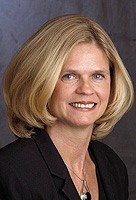Marilyn Carlson
Job Title: Professor in the School of Mathematical and Statistical Sciences and Director of Research Innovations in Mathematics Education at Arizona State University
Book Title:
Dr. Carlson is currently a professor in the School of Mathematical and Statistical Sciences and Director of Research Innovations in Mathematics Education at Arizona State University. Her current National Science Foundation (NSF) funded research project is developing and studying interventions and instructional resources to improve mathematics teaching and learning in undergraduate transition courses in mathematics.
Dr. Carlson was the Coordinator of the Mathematical Association of America’s (MAA) Special Interest Group for Research in Mathematics Education, and co-edited the MAA volume Making the Connection: Research to Practice in Mathematics Education. She received an NSF CAREER award to study student learning in calculus and has been continuously funded by NSF to conduct research on teaching and learning of precalculus and beginning calculus. In 2007 she received the MAA Selden Award for Research in Undergraduate Mathematics Education, and in 2013 she received the Outstanding Doctoral Mentor award at Arizona State University.
Dr. Carlson has served as Director of First-Year Mathematics at the University of Kansas and Arizona State University, and led the development of a Ph.D. concentration in mathematics education in ASU’s School of Mathematical and Statistical Sciences. She is the author of more than 60 published research papers. Dr. Carlson served on a National Research Council panel investigating advanced mathematics and science programs in U.S. high schools, and has participated in policy deliberations at state and national levels. Dr. Carlson has been an invited speaker at numerous international conferences; is a consultant to peer universities seeking to improve undergraduate programs in mathematics; has traveled to study school mathematics as practiced in China, Japan, and Singapore; and is engaged in national efforts to improve U.S. programs that educate and support teachers.
An Innovative Approach to Teaching Precalculus
When Marilyn Carlson began research on the Pathways program, she came to realize that student learning wasn’t being optimized in a traditional precalculus curriculum. Instead of learning the deeper meanings of math through conceptual thinking methods, students were only being shown how to work problems.
“There’s this big gaping hole in foundational mathematics content that is pretty widespread,” Carlson said. Mathematics education has taken on a cycle of teaching students to rely on the instructor for the interpretation and answers. This is a teaching method that Carlson is working to change by helping students engage in the thinking needed to learn and be successful in STEM fields.
Providing students with a solid mathematical foundation is what the Pathways program aims to do. The basis for this program is to encourage students to make meaning out of the mathematical concepts for themselves and not rely on their instructor to make the meaning for them. What Carlson and her team discovered is that when teaching math this way, it becomes a transformational process for many students.
“It’s no longer a spectator sport. It’s getting students in the game of making their own meaning,” said Carlson.
In Precalculus: Pathways to Calculus, Carlson and her coauthors focus on building a new precalculus curriculum that focuses on student engagement along with understanding the foundational concepts themselves. According to Carlson, when taking courses that use the Pathways precalculus curriculum, some students discover that they enjoy mathematics and want to pursue math and STEM-related fields of study, something they had never considered before.
“It is a product that will be a learning tool for both the student and the teacher,” said Carlson.
This shifting of academic focus is very important to Carlson as she would like to see more students entering into these fields, especially women. As a woman who has an accomplished career in mathematics education, Carlson wants to see this program encourage students to pursue a math or science career through meaningful instruction and strong role models.
For Carlson, the Pathways program is more than just a math class; it is a way for students to grow and make connections for themselves. Students may find themselves enjoying a discipline area they never thought of before and become invested in a career path in STEM. According to Carlson, “[Pathways] can shift their academic journey in ways where they are now perceiving themselves as a math person where they didn’t previously.”

